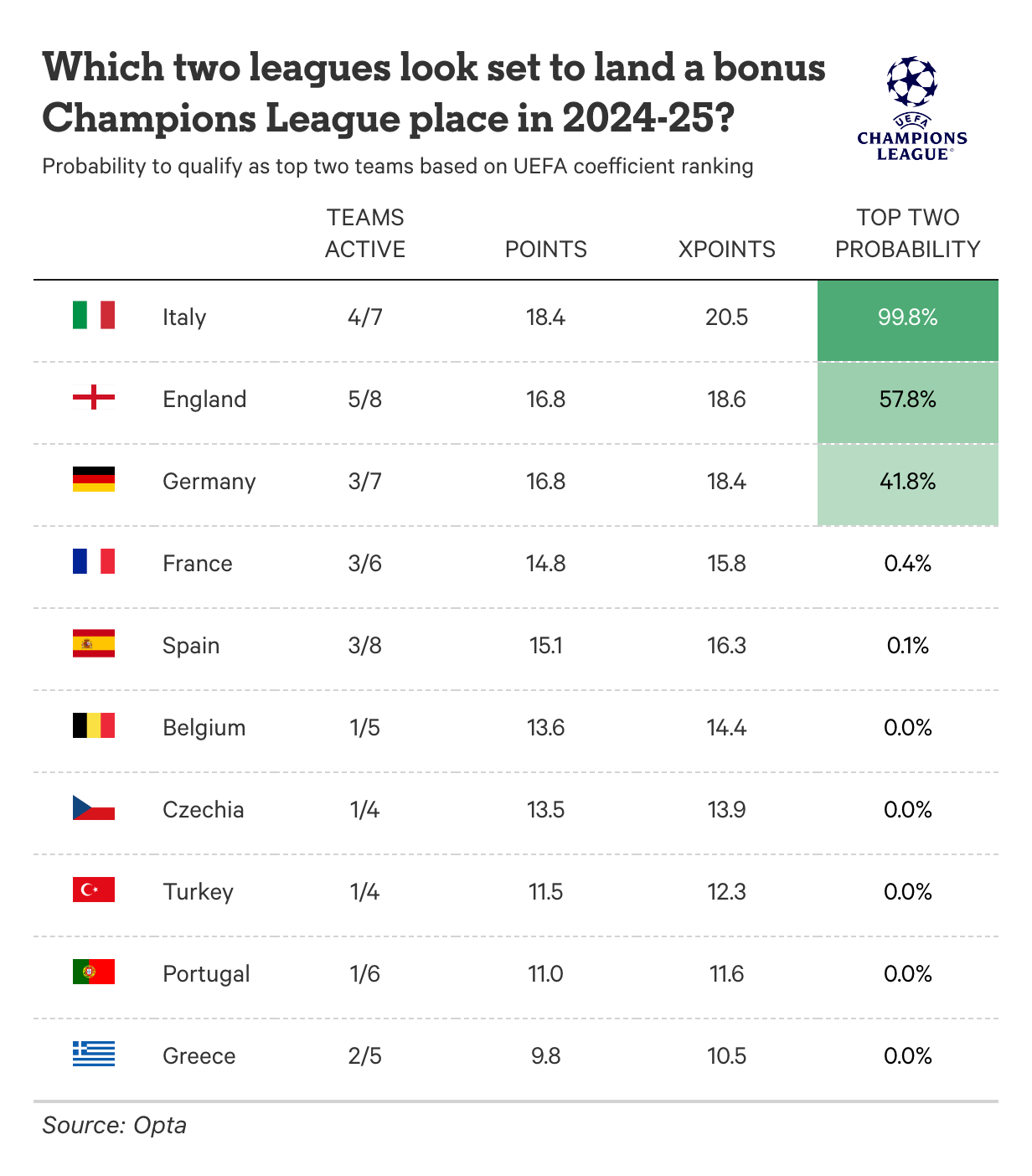Hopes of a fifth Champions League place for England took a hit this week as the five Premier League clubs in European action recorded only one win between them.
Liverpool were emphatically beaten by Serie A’s Atalanta 3-0 at Anfield, leaving Jurgen Klopp’s team with a mountain to climb for the second leg in Bergamo on Thursday. West Ham United were also beaten by Bundesliga champions-elect Bayer Leverkusen, falling 2-0 at the BayArena.
With Italy’s extra spot all but ensured owing to strong continental performances from most of its clubs this season, the Premier League is battling with the Bundesliga to be the other league to claim an extra Champions League spot for the 2024-25 campaign.
That is because two extra places — created through the expansion of the Champions League from 32 teams to 36 — are awarded based on each nation’s seasonal coefficient, which is determined by how clubs perform in the three European club competitions this campaign.
According to Opta’s prediction model, England are still narrow favourites to snag the second extra Champions League spot, but Arsenal’s second leg away to Bayern Munich is crucial. Manchester City can help proceedings, too, if they progress past Real Madrid at home on Wednesday.
So, what’s the picture heading into the European second legs? The Athletic explains below.
Why are there extra Champions League places on offer?
The Champions League will expand from the 32-team format to 36 teams at the beginning of next season. The Athletic has explained the format change in great detail, which you can find below.
Of those four extra group-stage slots, one will be given to the league that finishes this season fifth (currently France’s Ligue 1) in UEFA’s country ranking, which combines coefficient points accrued over the past five seasons.
One will be earned by a domestic title winner from one of the continent’s less prominent top flights via the ‘champions path’ qualifiers. The remaining two will go to the leagues whose clubs perform best across this season’s European competitions.
These latter two are being called the ‘European Performance Spots’ by UEFA and could see the fifth-placed Premier League team progress directly into next season’s new-look group stage.
Which nations are leading the race for an extra Champions League place?
Heading into next week’s second legs, Italy are almost guaranteed an extra Champions League spot next season, while Germany and England are neck and neck (on 16.785 and 16.750 points), although as referenced, Opta’s model is still giving the Premier League a 58 per cent chance of getting one of the two additional spots.

England had the most representatives in European competition at the beginning of the season (eight), but their seasonal coefficient was hurt by Newcastle United and Manchester United finishing bottom of their Champions League groups. Had they finished third, they would have entered the Europa League knockout stages, thus giving both sides opportunities to accrue more points.
Of the six teams who made it past Christmas, only Brighton & Hove Albion have been knocked out. They did at least add a couple of coefficient points to the tally by winning 1-0 against Roma in the second leg of their Europa League round-of-16 tie.
Before the quarter-finals began, Opta made England considerable favourites (70.6 per cent, with Germany on 29.1 per cent) to earn the extra fifth Champions League spot for next season, but the underperformance of Premier League sides this week has allowed the Bundesliga clubs to close the gap significantly.
It seems unlikely that England will have representation in the Europa League semi-finals. Liverpool have a history of European comebacks but a poor display this week at home to Atalanta leaves them as major underdogs.

Liverpool endured a torrid night against Atalanta at Anfield (Robbie Jay Barratt – AMA/Getty Images)
Meanwhile, in London, it will take a sensational performance from West Ham to overcome a 2-0 deficit against Xabi Alonso’s Leverkusen, a team who are yet to lose a game in any competition this season.
On the plus side, Aston Villa continue to go well in the Europa Conference League, beating Lille 2-1 at home in the first leg. They are favoured to progress to the semi-finals, where they will face Olympiacos or Fenerbahce.
That means England’s best chance of securing an extra spot in the Champions League lies in Europe’s top club competition. Progression for Manchester City against Real Madrid would help the cause significantly. After drawing 3-3 at the Santiago Bernabeu on Tuesday, they welcome Madrid to the Etihad next Wednesday, where they beat the same opponents 4-0 in the second leg of last year’s Champions League semi-finals.

Manchester City beat Real Madrid 4-0 at home last season (Michael Regan/Getty Images)
Arsenal are also on level terms, having drawn 2-2 against Bayern, but they have to travel to Germany for the second leg. If Arsenal get past Bayern and City beat Real, they will face each other in the semi-finals, guaranteeing an English club will make the final. That should seal a fifth Champions League spot for England, particularly if Atletico Madrid can knock out Borussia Dortmund on Tuesday.
Atletico looked set to beat Dortmund by a two-goal margin, but Sebastien Haller’s goal in the 81st minute at the Civitas Metropolitano keeps Edin Terzic’s side firmly in the tie at 2-1.
Spain’s La Liga has three of the eight Champions League quarter-finalists this season, but the performance of its teams in the Europa League and Europa Conference League makes it almost impossible for them to break into the top two places in this season’s coefficient. They could still have a part to play, however, as an Atletico win would damage Germany’s hopes, leaving the responsibility on just Bayern and Leverkusen.
Who would benefit from the extra Champions League place?
Continued progress in the Europa Conference League might be doubly beneficial for Unai Emery and his Aston Villa players.
Villa sit fifth in the Premier League, level on points with Tottenham Hotspur in fourth, though Ange Postecoglou’s Spurs have a game in hand. Villa have recently shown signs of decline from their excellent early season form, but Tottenham still have to play Arsenal, City and Liverpool in their final seven games of the league season.
Arsenal’s progression in the Champions League could be crucial to Spurs’ hopes of playing in the competition next season. It leaves Tottenham fans with the dilemma of wanting their north London rivals to beat Bayern and boost the Premier League’s coefficient while also hoping they do not get their hands on a first Champions League trophy before Spurs do.

Villa and Spurs are battling for fourth… but fifth might be enough (Joe Prior/Visionhaus via Getty Images)
In Germany, Dortmund could directly affect their prospects of playing Champions League football next season as they sit fifth in the Bundesliga. With six games remaining in their league season, they are level on points with fourth-placed RB Leipzig, who they will play on April 27.
In Italy, Roma are fifth, five points ahead of Atalanta in sixth. With Bologna sitting fourth, three points clear of Roma, and Italy’s fifth Champions League spot almost secured, they will likely make their first European Cup appearance since the 1964-65 season.
How can coefficient points be accrued?
As the above chart shows, there are plenty of points left on offer. With fewer teams left in Europe to win them, they are even more valuable and will have a greater difference in the overall ranking.
The coefficient contributing to that ranking is worked out as an average rather than a total to cancel out the advantage gained by nations with more European representatives. The equation is simple: the number of points accumulated by teams in a nation divided by the number of competing teams.
So, as eight English teams were competing in Europe at the start of the season, each of their points are divided by eight.
Here is how each country accumulates those points:
UCL = UEFA Champions League, UEL = UEFA Europa League, UECL = UEFA Europa Conference League
2 – All wins from the group stage (UCL, UEL, UECL)
1 – All wins in qualifying and play-off matches (UCL, UEL, UECL)
1 – All draws from the group stage (UCL, UEL, UECL)
0.5 – All draws in qualifying and play-off matches (UCL, UEL, UECL)
4 – Group stage bonus participation (UCL)
4 – Round of 16 bonus participation (UCL)
4 – Group winners (UEL)
2 – Group runners-up (UEL)
2 – Group winners (UECL)
1 – Group runners-up (UECL)
1 – Each round clubs reach from the round of 16 (UCL, UEL)
1 – Each round clubs reach from the semi-finals (UECL)
What is the breakdown for the extra places?
Assuming the extra spots will go to two of Italy, England or Germany, fifth place will enter the Champions League, and they will have eight (rather than seven) places in Europe.
If England wins the fifth spot, the European picture will look like this:
- Champions League: First to fifth in the Premier League
- Europa League: Sixth and the FA Cup winners
- Europa Conference League: Carabao Cup winners
If the domestic cup winners finish in the top six, those who finish in seventh and eighth will gain a place in Europe.
If the Bundesliga and Serie A win it, their European picture will look like this:
- Champions League: First to fifth in their respective first divisions
- Europa League: Sixth and cup winners
- Europa Conference League: Seventh
If a team wins the Europa League but fails to qualify for the Champions League, their domestic league could have six places in UEFA’s premier competition — the five places awarded by coefficient performances plus the Europa League winners.
Owing to West Ham’s first-leg defeat to Leverkusen and the strong likelihood that Liverpool will finish in a Champions League spot, this situation is unlikely to occur in England this season.
(Top photo: Stuart MacFarlane/Arsenal FC via Getty Images)
Read the full article here


